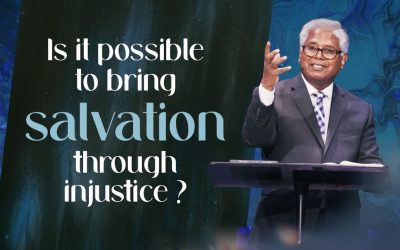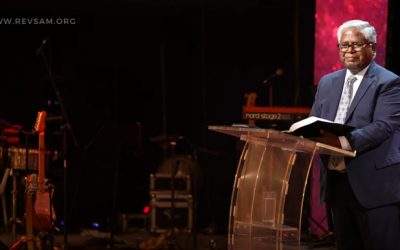
Abounding Grace (Vol 34) – Jesus Plus Nothing!
Sunday English Service – 21 FEB 21
Transcript
Let’s go to the Word of God. We’ve been teaching on the subject of grace for the last, many weeks and we have titled this series as “Abounding Grace”. Now in the teaching we went everywhere and then finally came to, last week, the book of Galatians. I spoke from the third chapter. Galatians, is a wonderful book, which deals with this particular topic of grace. It is works versus grace; that’s the topic there. So, we have a lot of things that are told and taught there, by the Apostle Paul. We need to pay attention too; it’ll be very useful for our practical Christian life. So, we’re going to go into that.
I introduced the subject last week, talking about whether we’re relying on works or relying on grace. It’s not about whether we believe that good works are necessary and whether we believe that we need to follow the 10 Commandments and all that. We do believe that we need to follow the 10 Commandments and we do believe that we need to do good works. We should not rely on good works in order to be accepted by God, in order to receive God’s favor, in order to receive salvation. We believe that we should not rely on observing the law in order to be accepted by God, to be saved, and so on. God’s law is good. Who would ever say that it’s wrong to follow the Laws of God? The Laws of God are good, and Jesus Himself interprets it, reinterprets it, beautifully. And Paul again, gives us more details on the same thing. And so, we do believe in obeying the law. We do believe in doing good works because the Bible says that we have been saved in order to do the good works that God had ordained for us before the foundation of the world. So, he ordained the good works that we should do and then only saved us. That’s how Ephesians chapter 2, verse 10 puts it. So, there are good works that God has ordained for us to do and we believe in doing them but good works don’t qualify us before God. That’s what we don’t believe in; that’s what we don’t rely upon. So, it’s a matter of whether we rely upon these things and keep that in mind, as we teach from the book of Galatians.
Today, I want to go to the second chapter. And from the second chapter, I want to today, teach on one particular truth and that is: Jesus, plus nothing. In the Christian circles, they talk about this doctrine as ‘Christ alone’. Jesus, plus nothing, is the way I put it here. Jesus, plus nothing. That means, we rely on Jesus and what He has done on the Cross of Calvary, plus nothing. That is the way the Bible teaches us about salvation. That’s the way we get accepted by God. Anything else, other than that, leads to bondage. See, when you rely on Jesus, there’s no bondage because there is freedom, there is joy, there is happiness because He has done everything; He has done everything perfectly. There’s nothing that can go wrong. Even though things don’t look right, we believe that we are in God’s mighty hands and we don’t doubt God’s goodness; we don’t doubt God’s love; therefore, we are perfectly happy, filled with joy, confidence and so on. But if you rely on your works, if you rely on your righteousness, your goodness, and all those things, then you have a lot to worry about because when bad things happen, you really wonder whether this is the punishment and judgment from God because you’ve not been right and there are so many things to worry about because so many things can go wrong because you are relying on yourself and your works and your goodness and so on. Therefore, many things can go wrong, and nothing can go wrong with God. If you rely on God, everything is perfect. Amen. So, please understand that this is what we’re going to talk about.
Let me read to you, from Galatians chapter 2, verses 1 onwards, all the way to verse 10: “Fourteen years later, I went up again to Jerusalem, this time with Barnabas. I took Titus along also. I went in response to a revelation and set before them, the gospel that I preach among the Gentiles. But I did this privately to those who seemed to be leaders, for fear that I was running or had run my race in vain. Yet not even Titus, who was with me, was compelled to be circumcised, even though he was a Greek. This matter arose because some false brothers had infiltrated our ranks to spy on the freedom we have in Christ Jesus and to make us slaves. We did not give in to them for a moment, so that the truth of the gospel might remain with you.
As for those who seemed to be important – whatever they were, makes no difference to me; God does not judge by external appearance – those men added nothing to my message. On the contrary, they saw that I had been entrusted with the task of preaching the gospel to the Gentiles, just as Peter had been to the Jews. For God, who was at work in the ministry of Peter, as an apostle to the Jews, was also at work in my ministry, as an apostle to the Gentiles. James, Peter and John, those reputed to be pillars, gave me and Barnabas the right hand of fellowship when they recognized the grace given to me. They agreed that we should go to the Gentiles, and they to the Jews. All they asked was, that we should continue to remember the poor, the very thing I was eager to do.”
Here, Paul is talking about his trip to Jerusalem for the second time. This time, he went with a purpose there and he tells us about the purpose. He says, he went there because he wanted to clarify certain things, with the apostles there in Jerusalem, who were senior to him. He wanted to go there, to make sure that he’s been doing the right thing, because, in Acts chapter 15, we read when he and Barnabas were in Antioch, ministering there, they had some visitors that were Judaizes, that came in, ministering there. They saw the Gentile converts and they began to teach saying, that you need to obey the law of Moses, and be circumcised. In other words, they were saying, you need to first become a Jew, then only you can become a Christian. It’s fine that you’ve accepted Christ but you need to be taught about circumcision, and obeying the Laws of God because without that, how can you be accepted by God? In other words, they are saying, you can’t be really saved, without circumcision, and obeying the 10 Commandments and so on, the Laws of God. You can’t be saved just by believing in Jesus Christ as your Lord and Savior. That’s what they were saying and Paul and Barnabas stood against those people. We read about it in Acts chapter 15. It says: Some men came down from Judea to Antioch and we’re teaching the brothers: “Unless you are circumcised, according to the custom taught by Moses, you cannot be saved”. This brought Paul and Barnabas into sharp dispute and debate with them. So, Paul and Barnabas were appointed, along with some other believers to walk to Jerusalem to see the apostles and elders about this question. The church sent them on their way, and as they traveled through Phoenicia, and Samaria, they told how the Gentiles had been converted. This news made all the brothers very glad. When they came to Jerusalem, they were welcomed by the church and apostles and elders, to whom they reported everything God had done through them.
Then some of the believers who belonged to the party of the Pharisees stood up and said, “The Gentiles must be circumcised and required to obey the law of Moses”.
See, the problem began like that. Some people came to Antioch and taught that people needed to be circumcised and they need to be taught the Law of Moses, so that they can obey it. Without that, how can you be accepted by God? And as they were sharing the information, some Pharisees were there, and they also stood up and they spoke up and said, “Gentiles must be circumcised and required to obey the law of Moses”. It means that’s a qualification for salvation. That’s the way they were putting it. Therefore, the council of the apostles had to gather and decide right then and there, whether what Paul was teaching was right, or whether these men were right. That’s what went on there. So, Paul writes about this whole thing in Galatians chapter 2, because he’s going to address this whole problem of grace versus works; relying on works verses relying on grace, and so on. He’s talking about that here.
Now, in this, there are several things to be noted. One is, this whole thing tells us, that truth is absolutely critical; doctrinal truth is absolutely critical to Christians, Christian believers. Because as we just read that, “This matter arose because some false brothers had infiltrated their ranks to spy on the freedom”, he says in verse 4, in Galatians 2. “…spy on the freedom we have in Christ Jesus and to make us slaves”. See how he puts it? See, when you’re saved, you’re brought into freedom because you rely totally on Jesus. So, he says, this freedom we had but they wanted to enslave us again. Religion enslaves, you see? And, “We did not give in to them for a moment, so that the truth of the gospel may remain with you”, he says. Because they knew the truth – Paul and Barnabas – because they knew the truth, they did not give in to them, even for one moment, when they came to disturb the church, with this wrong kind of emphasis. The church is often attacked by these kinds of things because the devil is interested in totally bringing people under bondage. They were in bondage, at one time, to the devil, when they came and receive Jesus as Lord. He wants to again bring them into bondage, somehow sometimes, the religious kind of bondage, and I will talk about that in a few minutes. And when that attempt was made to bring them under bondage, Paul and Barnabas, stand against it; they fight for the truth, the truth of the gospel, so that we have the truth remaining with us even today. I appreciate the great Apostle Paul. So, he feels that truth is very important.
Now today, we live in times, when people want some kind of spirituality without theology; or they want some kind of a spiritual experience. Even Christians – you find it’s some kind of spiritual experience, they want; they want prayer, they want prophecy, they want this, that and some excitement and so on. But they don’t want strong, doctrinal truth; they don’t appreciate strong, doctrinal truth. They don’t have an appreciation for it, many times, because they think it’s a waste of time, paying attention to so many doctrine truths and going into it deep and teaching it systematically and so on. They think there is not much use for it. They want the excitement of religion. They want the excitement of spirituality. They want the excitement of having these experiences of going to heaven and going to hell and, seeing this, seeing that and receiving some prophecies and having some miracles happen, and so on. But they don’t want to go into the truth, doctoral truth. Thing is, they don’t want to have to bring their mind and their entire life in subjection to the truths because truth – that’s what it will do; it will change you from inside. It will change you and radically transform you. They want to superficially live, enjoying all these experiences, religious experiences, you see?
Now, what is truth? What is doctrinal truth? C.S. Lewis puts it this way; C.S. Lewis says, that it’s like a map. In the map, you can look at where you are and where you’re going and see the exact direction which you must take, the roads, and so on, and get there safely. A map is absolutely essential, in order to travel. Even if somehow, you’re taken there and put there, in that city, that you want to go to, you won’t know where you are, without the help of the map. You won’t even be able to locate yourself. You won’t know whether you’re in the south or north or east or west, where you are, without the map. With the map, you can figure it out. And you can figure out where you’re going. The map is so important. So, consider Christian life. We have a map, that is a truth. The truth says that we are sinners and God has got the way of salvation; the way of salvation is Jesus and through what He has done on the Cross of Calvary. And that map led us to our destination of peace, joy and happiness and eternal life, and so on. So, the map is very important. When you lose the map, then you cannot get to the destination.
So, Paul believes that if you lose the truth, the doctrinal truth, you will lose your freedom. Just like you cannot get to the destination without the map. If you lose the truth, the doctrinal truth, you will lose your freedom, which is your destination – the joy and peace and happiness and eternal life, all of that will be lost, he says. And this is what he is saying over and over again. He is going through that, right here. He says, “If you lose the truth, you will lose the liberty, you will lose the joy and peace and your freedom will be gone. The love will be gone, the power will be gone, the glory will be gone, everything will be gone. If you lose the truth, which is like a map. You’re lost, completely”, he says. Paul says, “Without the truth, you will not know His everlasting arms; you will not know the weight of His glory; you will not know peace like a river, and you will not know the shelter of His wings”. You will not know any of these things, that we talk about from the Bible, all the time. The truth is not those things but the truth, will help you to find them, help you to arrive there, arrive at peace, arrive at His shelter, and so on.
So, what is truth? Truth, according to Paul here is, that you are accepted through Jesus Christ, plus nothing. That’s our sermon today: Jesus, plus nothing. What makes you acceptable, what makes you loved, what makes you received by God, is Jesus, plus nothing. That’s the truth and that’s the truth he has been teaching. That is the truth he has been teaching the Gentiles; that’s how the Gentiles came to Christ. Now, he’s got a whole bunch of them and these people come and infiltrate that place and try to bring in their doctrine. They say that you need Jesus, plus this. But Paul had taught, ‘Jesus, plus nothing’. Is he right? Look at verse 6: As for those who seemed to be important – whatever they were makes no difference to me; God does not judge by external appearance – those men added nothing to my message. He says, “those people that seemed to be important – whatever they were, it doesn’t matter to me”. He’s talking about Peter, James, John and all these important apostles, who were senior to him. He says, “They seemed to be important, but it doesn’t matter to me”. Is the truth, right truth? God is not a respecter of persons. He doesn’t go by external appearance. Is the truth, right? “They’re talking about truth”, he says. It not that this man said, that man said, he said. No, no, no. Is that the truth; is the truth, right? He said, “Those men added nothing to my message”. I believe this is the most important line, in this whole book of Galatians. He says, “Those men added nothing to my message”. It is another way of saying, “I presented to Peter, John, James, all these important apostles, all that I preached, how I preached the gospel to the Gentiles. They’re there before me; they should know better. They heard me out when I told what the problem was; how these Judaizes were causing the problem and what I was preaching. “And those men added nothing to my message”, means, that they agreed totally with my message. They did not say that I was wrong, they did not say that you need to add this or that. He particularly mentions Titus – He said, “I took Titus with me, who was a Greek, as a test case (might be). He took Titus, see what they’ll do to him, whether they’ll compel him to be circumcised. He said none of that; they didn’t even ask him to be circumcised, he says in verse 3, even though he was a Greek. That means, the apostles totally agreed, with the Apostle Paul; agreed with the approach that he was taking. So, that is the most important line there.
So, he found, by going to Jerusalem, and conferring with the apostles, he found that what he has been teaching, is absolutely right; there is nothing wrong with it. Because of the way Paul deals with the law and the works of the law, and all of the things, here in the book of Galatians and particularly in this case. Some people get confused and they say, “Wait a minute, is Paul actually saying that the Gentile converts don’t need to obey the 10 Commandments? Is he actually saying that the Gentile converts don’t need to obey the law, the Law of God? Is he actually telling them, hey, you can do whatever you want; you can lie, you can steal, you can cheat, you can murder, you can do anything? You can do it all, it doesn’t matter because the Law of God doesn’t apply to you. Is that what he’s trying to say? Is he rejecting the law as something that is applicable to the Gentiles? Is he saying that?” Because as I said, we know from his letters, like Ephesians, Colossians, Romans and all of that, in the later part of the letters, always, he used an exposition of the 10 Commandments, basically. Because he’s talking about practical living, and he’s got to go back to that. He bases his teaching on the ‘Sermon on the Mount’, and gives his exposition on Christian life and living, and he always deals with the 10 Commandments. So, if he was against Gentiles keeping the Law of God, he would have never done that. Plus, you and I know that the 10 Commandments or the Law of God, in general, the Moral Laws of God, is actually a general thing. Because when Paul talks about it in Romans, chapter 2, he refers to how Gentiles might one day say, “We didn’t know the 10 Commandments; therefore, we didn’t obey it, we didn’t do it, you can’t hold us accountable for it on the judgement day”. He says, “No, no, you didn’t have the 10 Commandments; the 10 Commandments were not given to you, right? But you had the 10 Commandments written in your heart. In your heart you know, murder was wrong; in your heart you know, covetousness is wrong; in your heart you know, adultery is wrong; in your heart you know, you should not bear false witness; in your heart you know, there is one God. In your heart you know all that. You know how to honor your father and mother; all of the laws are written in your heart, he says.
So, 10 Commandments, as far as the Moral Laws are concerned, it’s a thing for the entire human race, basically, but it was given to the Jews, written in the tablet of stone. It was given to them. That’s the only difference. Just because it is not given to the Gentiles, it doesn’t mean that those laws don’t apply to the Gentiles. Some people teach it like that. It’s not so. What he’s saying here is, there are laws that are called the Ceremonial Laws. What are the Ceremonial Laws? They’re called the ‘Clean Laws’ according to the Old Testament. The Ceremonial Laws are the ones that they are referring to here. The Judaizes here, is not worried about Paul, not teaching the moral commandments – the 10 Commandments – to the Gentiles. They’re not worried about that at all. They’re particularly worried about the fact that he’s not teaching the Ceremonial Laws. They feel like that he’s not telling them to observe the ceremonies; certain ceremonies are not observed. So, they say, you need to observe the Ceremonial Laws; that’s the point that they are making. The Moral Laws set apart the observers of that law, ethically, from others. They are different, ethically, from others, when they observe it. The Ceremonial Laws, on the other hand, sets apart the Jews, from other cultures; the Jews from the Gentiles. That’s what it does. The Moral Laws that made you different, ethically; the Ceremonial Laws made you different, culturally. There was a big cultural difference between the Jews and the Gentiles because the Ceremonial Laws of the Jews meant, that they looked different, they ate different, they lived different, everything about them was different. So many differences, they could not ever come together. They were so separated culturally, that kept them apart.
Now what was the purpose of these laws? They were called ‘Clean Laws’ in the Old Testament and the concept of being unclean and clean, was a very big thing in the Old Testament, purposely it was introduced. What these Clean Laws were about, they were about all kinds of things. I mean, you’ll be amazed. You could not touch a dead animal, because that will make you unclean; you cannot eat certain things, that will make you unclean; you cannot touch a Gentile, that will make you unclean; you cannot sit down and eat with a Gentile, that will make you unclean. You know, all kinds of things made people unclean. Unbelievable and there’s hundreds and hundreds of them; to learn it and to follow it, is a big thing.
So, it was given for two purposes. One purpose is, to show the person that there is absolutely no way, you can make yourself acceptable to God. See, the Clean Laws were given, and they were so numerous, so wide in variety, that whatever you did, made you unclean. So, it was difficult to be clean. You were unclean, every day, from morning till evening. It was like a voice telling you, you’re unclean, you’re unclean and so, no matter what you did or how much you took care, to obey the Clean Laws, you ended up offering a sacrifice. When you went to the temple, you had to offer the sacrifice; when you went to the tabernacle, you better go with a sacrifice, because you’re unclean. Look at the high priest: now, he’s a big shot. He’s supposed to be a big spiritual fella but when he goes, he’s got to offer sacrifice, in order to make sure that he is holy enough to enter into the presence of God. The Clean Laws said, “Look, you’re unclean. Don’t come into the presence of God”. It made them conscious of their uncleanness, mainly the consciousness of the fact that they are unworthy before God. They are unclean in their hearts. They were unclean. How to teach them, that they were unclean, not holy enough to come before God. This was the best way to do it. Whatever they touched, it was unclean; wherever they went, it was unclean. It was difficult to live in a society, in this world, with these Clean Laws. Everything made you want to clean. Every day you were unclean. Every day you are made conscious of the fact that you’re unclean. It was like a thousand voices coming at you, every day saying, “unclean, unclean, unclean!” Seems the lepers were made to stay outside the town, and when they ever happened to be anywhere near anybody else – suppose somebody was passing by and these people are found anywhere near – they are supposed to shout, saying, “unclean, unclean, unclean!” All these things were done. Why? To make them conscious of their uncleanness. What did uncleanness mean? What happens when a person is unclean? Suppose he touched a dead animal and he’s unclean. What must he do? He cannot go to the tabernacle; he cannot worship God; he cannot go among the people of God, among worshipers; he cannot be a part of anything. That’s the main thing. You cannot come to God; that’s the main connection there. That’s what unclean meant. It’s not just some health laws, like some people think. It has some spiritual significance. The spiritual significance was more than the natural. They could not come to God. That’s the main thing. You’re unclean, you cannot come to God. You’re unclean, so stay outside. You’re unclean, so don’t come near. This is the concept.
The second purpose is, that it was used in those days, to set apart Jews, culturally, so that they will never, ever mingle with others, the Gentiles. Purity had to be maintained because Messiah is supposed to come through the Jews. They should not disintegrate and just go and become just like others, and be gone. They need to stay as a nation together, completely, and the Messiah should come. Therefore, in order to maintain their purity, this was done, so that they’ll be culturally different. So, they were given laws about what they should eat, what they should not eat and what they should wear, even fabrics, certain fabrics, they could not wear. All these laws, terrific laws were given, to keep them separate. They could partner with others, the Gentiles, in business. They could not intermarry and all kinds of things were there. It was a way to keep the Jews from being seduced away from the true and living God.
Now, the Bible says certain things about the Ceremonial Laws, in the New Testament – the significance of these Laws in the New Testament. Please listen to Hebrews, chapter 9. Hebrews chapter 9, verses 9 and 10: This is an illustration for the present time, indicating that the gifts and sacrifices being offered were not able to clear the conscience of the worshiper. They are only a matter of food and drink, and various ceremonial washings – external regulations applying until the time of the new order. What it is basically saying is, that these things were illustrations, indicating that all these sacrifices and so on, they are not able to clear the conscience of anybody, of the worshiper. They are only a matter of food, drink and various ceremonial washings – external regulations, just had to do with washing this and washing that, applying until the time of the new order. It changed nothing; it was just a physical ceremony. It changed nothing. It could clear nobody’s conscience. It could cleanse nobody’s heart. But yet, they were cleaning their hands, sprinkling it here and there and doing some cleansing ceremonies, and so on. But it cleared nobody’s conscience; it cleansed nobody’s heart. This was carried on as a symbol of something greater, something spiritual until the time of the new order. That is the new covenant and what happens there, though Jesus Christ.
Now, listen to the new order and what happened. Chapter 10, verse 8: First he said, “Sacrifices and offerings, burnt offerings and sin offerings you did not desire, nor were you pleased with them” – although the law required them to be made. See, he was not pleased with them, yet, the Law required them to be made. Why? Then he said, “Here I am, I have come to do your will”. He sets aside the first to establish the second. So, when Jesus came, He set aside the first to establish the second. How did He come? He said, “Here I am, I have come to do your will.” What was the will of God? That He must become the sacrifice; He is the perfect sacrifice. He is the one and only, once and for all sacrifice, come to do away with mans’ sin, to cleanse man, man’s heart from his sins and to clear all consciences. He has come to do that and by that will, we have been made holy, through the sacrifice of the body of Jesus Christ, once and for all. See, “I’ve come to do the will”, He said, while he was coming. What was the will? To die on the cross, to become the perfect sacrifice, to do away with all the uncleanness, and clear everybody’s conscience and so on. And by that will, we have been made holy, through the sacrifice of the body of Jesus Christ, once and for all. Once and for all, we’ve been made holy. That’s the New Testament.
See, until the new order came, certain things were followed, certain ceremonies were followed. It was only symbolic until the new order came. They were preaching about something; they were signifying something. The new order is the New Covenant and under the New Covenant, the real cleansing took place, the real uncleanness of man is taken away. In the Old Testament, a thousand voices were telling man, every day, “you’re unclean, unclean, unclean! It was purposely done, so that he will know that he needs a Savior. He must know that he needs a cleansing. He must know that nothing in this world can cleanse him from his sin. God must intervene and do something. He must know that he needs a Savior, then the Savior comes and He sheds His blood; He cleanses every heart; He clears every conscience. It’s done. All right. In the New Testament, a thousand voices are saying, “You’re made holy, you’re made holy, you’re made only, once and for all, by the perfect sacrifice, by the body of the Lord Jesus Christ!” And what happened to that body? What a difference between the Old Covenant and the New Covenant. The Old Covenant is saying, “You’re unclean, unclean, unclean!”; the New Covenant is saying, “You’re clean, you’re holy, holy, holy!”.
Now, do we observe those Ceremonial Laws? Some people say, “Well, we do observe the Moral Laws now. We are obligated to observe the Moral Laws today, even under the New Covenant, but we are not obligated to observe the Ceremonial Laws”. Well, if it’s God’s Law, you have to observe all the laws or let me put it another way. If it’s God’s Laws; the Laws of God, are relevant. So, in the New Testament times, how do you observe it? How do you observe it? Are you going to say it’s annulled; it’s cancelled? Under the New Covenant, the Ceremonial Laws are no more there? No, the significance is there. The significance is that you are unclean, in your heart. And there needs a cleansing and the Savior needs to come and cleanse and that has been fulfilled in the New Covenant. In the new order, Jesus has come; through Him, the cleansing has taken place. Right.
Now, because this has come. Now, if you go back to sprinkling seven times here and there, touching your nose and touching your ears and going through the cleansing procedures to remedy the unclean, like in the Old Testament. If you keep doing that now, I would say, that is the worst way of dishonoring God, instead of honoring God. You can’t tell me, “Well, I’m honoring God, brother because God told me to do it; I’m sprinkling this several times here and touching my nose here and touching, you know. That is the worst way of dishonoring. Why? Because God has sent His own Son; He died on the cross; He shed His blood. Cleansing has happened, conscience has been cleared, which nothing in the whole world can do. Jesus Christ has come and done. And if you still insist that you’re going to do this other thing, which is only signifying these things, which is only symbolic of these things, then there is nothing worse than that, that can dishonor God, my friend. So, what do you need to do in order to observe the Ceremonial Law of cleansing? What do you need to observe? You need to believe in the Lord Jesus Christ, and put faith in what He has done on the cross. And instead of calling yourself ‘unclean’, you need to call yourself ‘holy’ by the blood of the Lord Jesus Christ. That’s the way to honor. That’s the way to observe this law. Hello?! I hope you’re getting it.
So, do we observe this Ceremonial Law? Yes. Every time I look at the blood of Jesus. I preached on the blood of Jesus for a whole series, that’s why. Every time I look at the blood of Jesus and I see it as my cleansing thing – the thing that cleansed my heart and cleared my conscience and made me holy. Every time I believe that, every time I put my faith and stand in faith in that, I am observing, literally. In reality, I’m observing the Clean Laws of God. So, think about that. I think you better get that really well.
So, do we observe the Moral Laws? Yes, we observe the Moral Laws. Yeah. We don’t steal, we don’t kill, yeah, we observed the Moral Laws and the power to observe them, is given to us, by having a new heart and new power by the Holy Spirit. We’re able to do that. Yes.
Do you observe the Ceremonial Laws? I would say yes, technically, yes. You observe the Ceremonial Laws. We don’t go back to it because we went back to the Old Testament type of observance. You are dishonoring what God has done. Now, the Savior has come, the cleansing has happened, put your faith on it. By that, you observe the Ceremonial Laws. So, the Ceremonial Laws are not annulled. It’s just the reality has come, so we don’t go back to the shadow. That’s the thing that is happening, right? All right.
So, what is Paul saying here? Paul is saying, “Look, the reality has come; something better has come. The new order has come. But these people are trying to pull us back into that. When you go back into that, bondage is going to come because you don’t know whether you have done enough good cleansing and after all the cleansing you have done, you’re still unclean. That’s the thing you’re going back into; that’s bondage. We have come into freedom, the liberty, the joy, the happiness. Why do you want to go back into that?” You see, when you add Jesus, plus something, terribly wrong, my friend. It leads to, first of all, spiritual bondage. Listen to this. It, first of all, leads you to, spiritual bondage.
Now, what is spiritual bondage? Spiritual bondage is what these fellas we’re trying to lead the people into. Paul calls them “fake brothers”. You know, there are many fake brothers today, in our world, also. What are they trying to do? Anybody that tries to tell you, “Yeah, you have received Jesus but listen, you need to do this also. How can you be saved? How can you go to heaven?” That is spiritual bondage; that leads to spiritual bondage. Anytime they try to add something, it is spiritual bondage. Even if they try to add your good works, that’s spiritual bondage. See, that’s the thing, that you need to carefully note. Some people have tried to act – well, let’s take this here. “Alright, you’ve received Jesus as your Savior but without good works, how are you going to go to heaven?” That’s spiritual bondage, my friend. That’s spiritual bondage because, if everything relies on your good works, then how can you be happy? If everything relied on my… whether I go to heaven or not, relies on my good works, if that is so, then I can’t sleep. My prayer, every day, will be, Fair Lord, don’t come today. Today, I made one mistake. I’m not so perfect, how will I go? Every day, my prayer will be, Lord, don’t come today. I remember when I was young, one man came and preached. He preached about the second coming of Jesus and the way he preached it, you would have decided that nobody in that hall was going. I decided that day, nobody is going. If Jesus came today, everybody is going to be here only. Somebody else may fly out, but none of those people in that hall. That’s the way he preached it. I mean, it scared me. And I remember coming out, I prayed, Lord, don’t come today. Just give me two, three days’ time, I’ll make everything right and get ready. So, if you are relying on your good works, I’ll tell you, you’ll be immediately unhappy. You’ll be unhappy every day. There’s not one moment of happiness, you’re going to have. That’s bondage; that’s spiritual bondage.
George Whitefield, a great preacher, preached a sermon, years ago, called, The Method of Grace. And in that, he laid out this grace truth, very well. He said that, when you come to God, truly when you are repentant, and you’re coming to God and something really happens to you and you’re converted and come to God. You should not only be troubled for the sins of your life; you should also be troubled over your best performances, your good works, your goodness, and all of that. Now, to hear that, it may sound very harsh. What do you mean, ‘be sorry for your good works and your performances, the best performances’ of various things? How can you be expected to be sorry for your goodness? After all, you’re being good only. God must like that. After all, it’s good performance, God must like that. Why should we be sorry? That’s the question people ask. They think, this is very harsh preaching of back in the old years, you know. Some 200 years ago, these people preached so hard, they think. No! He’s coming from the grace angle; he’s looking at it from the grace angle. He said you should be sorry for your sins, but you should be sorry for your goodness, for your self-righteousness, for your best performances, you should be sorry also. You must repent of it also. It’s not enough to repent of your sin; you must repent of your best performances. Why? Because he said, “Why did you do the best performances?” You did it because you wanted to qualify yourself before God! You thought that it’ll make you acceptable to God.
Now, people say, what is wrong with that? I’ll tell you what is wrong with that. Please listen. You know what is wrong with that? To think that this will make you acceptable before God; all you good works will make you acceptable before God. Bible says, “All have sinned and come short of the glory of God”. Therefore, it’s very clear that nobody, on their own, can satisfy God. Nobody, on their own, can find some kind of righteousness, on their own, which will satisfy God. So, God sent His Son. On the cross, something happened. The Bible says God took our sin and put it on Jesus. God made Him, who knew no sin, to be sin for us. He took our sin and put it on Him, so that He became sin for us, so that we might be made the righteousness of God in Him. That means, He put our sin on Him and made Him to be sin and He put His righteousness on us, so that we may be the righteousness of God, in Christ. So, He became sin; we became the righteousness of God, in Christ. It’s a tremendous exchange that took place. God sent His Son, killed Him on the cross, made His shed His blood, put our sin on Him and his righteousness on us and called us righteous. And you’re telling me, that you won’t put your faith in what God has done, through His Son, and you will put your faith on what you will do? You mean to say, that what you will do, however good it is, whatever goodness there may be in it, you think that your goodness is better than God’s work, in which He gives His righteousness to you?
I will say to you this: since God has done this, sent His Son and made Him to die, take your sin and put it on Him and His righteousness, and put it on you. Since God has done this great act. If you resort to this, if you feel believe that your work will satisfy God and should be enough and should be enough to satisfy God – after all, this is goodness – if you think like that, that is the greatest sin. It is worse than sinning. You must be repenting of your sin but you must repent of this more, my friend because this is the greatest insult. Because you’re saying, “Yeah, God did something on the cross but what I do, is much better. I don’t put my confidence on what God has done; I put my confidence on what I have done”. That is the greatest way to insult God. That is why George Whitefield says, you must repent not only of the sinful deeds that you’ve done; you must repent of your goodness, and your righteousness because you are not accepting Christ’s righteousness. And you are exalting your righteousness. That’s the worst sin, he says. Amazing truth.
George Whitefield says, that as soon as the man comes in the conviction that he’s a sinner, the natural tendency of anyone is, to immediately resort to this attitude that says, Oh, yes God, I’m a terrible sinner. I have sinned. I’m sorry. But hereafter, I’ll be better. Hereafter, I’ll stop this and I’ll stop that. And I won’t do this. And I will do that. And I’ll try my best. And live the best life possible, oh, God. I’ll try. I’m going to really try, this time. That’s a natural tendency, that any of us do that. It’s a natural way because we realize we’re sinful, we immediately resort to making up for it. That’s what Adam and Eve did. They sinned in the Garden of Eden and they realized their nakedness, their shame; they went and hid. As soon as they realized that they sinned, they should have gone to God and fallen at His feet and said, “God save us; we are sinners”. They didn’t do that. You know what they did? They went and hid and got busy making fig leaf clothing for themselves. In other words, let me fix my problem. Only God can fix the problem. Finally, God had to come and kill an animal, to take its skin out and clothe them. How would their fig leaf be enough to clothe them? He made a more permanent solution – killed an animal, took the skin and clothed them. They were clothed with blood. He was preaching the gospel to them. Only God can do it. They didn’t realize that. They said, “We’ll do it. Oh, we have sinned and we are in shame and we are naked. We’ll fix it. We’ll fix it”. That’s the exact sin everybody commits, even today. It’s natural, we all do that. That is the problem that everybody commonly has.
So, even when we receive Jesus as Savior, we say, “Well, I’ve received Jesus as my Savior. I’ve asked Him to come into my life. I’ve really given myself to Him”. And then they say, “I promised that I will live the best life possible, for Him. I will live as best as I can. I’ll do my best hereafter”. That’s what it comes down to. You’re now adding Jesus, plus something. That’s what is wrong with it. It puts you in spiritual bondage. You can never be happy; you’ll never be fulfilled. Not one moment of happiness and satisfaction, peace, you will have because now, you’re relying on yourself, your goodness, your ability to do your best. How can you be happy because you know that every day, you’ll fail? It’s like in the Old Testament: “Unclean, unclean, unclean, unclean!” A thousand voices will say you’re unclean! How can you fall asleep? How can you have peace? True peace comes, when He has cleansed you and you believe it and you declare yourself holy. I’m holy because He made me holy; His blood, the blood of the Son of God, the precious blood of Jesus, cleansed me for all my sins, therefore I’m holy. You’ll have peace, right.
The second kind of bondage is the cultural bondage. There is always going to be a tremendous danger on the part of Christians to fall into cultural bondage. Now, what is cultural bondage? That is also something that is exactly happening here, in Galatians chapter 2. See, Gentiles are getting saved; they’re coming into the church. And these Jewish guys are coming and trying to make them Jews. That’s cultural bondage. They’re trying to circumcise them; they’re trying to tell them to become observers of the Ceremonial Laws. Then you’ll receive Jesus, then you’ll be saved. See, this is cultural bondage. You’re taking somebody from some culture and bringing him into Judaism and imposing Judaism culture on them. It’s cultural bondage. That is something that happens, even in our day. We don’t have this thing about circumcision; nobody’s telling us to get circumcised, these days. But, do you know that as soon as a person comes to Christ, there are many people that are jumping on him from everywhere, catching a hold of him, trying to make him just like them, from head to toe. They’ll tell him how to cut his hair.
I remember when I was young, I was told to cut my hair this short because that was the thing that was acceptable to God. How can you go to heaven, having hair like this? Cut it like this. You shouldn’t require a comb; you shouldn’t be looking into a mirror; you shouldn’t be combing your hair. Just cut it like this and that’s it. Style your hair and all those things. All that is sin. Just cut it like this. So, they’ll start with the head and come down. They’ll tell you what your shirt must look like. They told me: my shirt should not have colored buttons; that I should not wear shirts like this. I should wear plain and one particular color. One color is only acceptable before God. How can you go to heaven with this color? How can you call yourself a Christian, while having a hair like this? How can you call yourself Christian, with a shirt like this? They’ll come all the way down to your belt and your shoes, your chapels, everything. They’ll always tell you: how can you go to heaven like this? Then they’ll work on your jewelry; what you can wear, what you cannot wear and all that. They’ll tell you, if you’re wearing jewelry, you cannot go to heaven. I remember one man writing, making a list about who will all fly away when Jesus comes. He says those who wear jewelry like rings, whatever, you know, they will all be left here. They will not be taken up. See this is Jesus, plus something. This is what I’m talking about. This is happening, now. This is happening in our age and day. This is not Christianity. From head to toe, they want to make him look like them. The fella has to dress like them; have a haircut like them and everything like them. And now, they’ve come up with new things. You have to sing like them, play music like them. Ah! They say, “How can you sing songs like this and go to heaven? This is hell’s song; this is devilish song; this has come from the pit of hell”, they say. I’m talking about Christian songs that some guys sing. They condemn it so much and the way the music is played, is condemned so much. They condemn the sound of the guitar, the sound of the speakers. They condemn the sound of everything; the technology used, and whatever, the lighting is used and so on. The condemn everything. How can you go to heaven? See, this Jesus, plus something. And I say Jesus, plus nothing. They say, all this is wrong; this is glorifying the devil. Well, we’re singing about Jesus. Oh, you should do it in the right way. Which is the right way – your way? How you used to do it 70 years ago? The same kind of tunes, the same kind of playing, the same kind of technology. Let’s bring back the tin can speakers and the microphones that sound like tin cans and use them. Is that what is going to satisfy you? I can’t understand. Terrible. Cultural bondage, they try to bring you. They want to make you, just like them. Sing our songs, sing our type of music; any other type of music is wrong. Any other way you put the stage, is wrong. Any other way you have a backdrop, is wrong. Any other way you play music, is wrong. Any kind of song that’s different from ours, is wrong.
See, cultural difference, is not just from one nation to another. See, when talking about Jews and Gentiles, it’s not just the difference between one nation to the other. Sure, there are differences between one nation to the other, one language to another, one people group to another, there’ll be differences. But do you know cultural differences happen in your own home? If you have children, you’ll know; if you have teenagers, you’ll know. Have you ever seen a family go and order food or a family order, by phone, food, these days? The father and mother would be ordering Sambar Sadam, Thayir Sadam, some Curd rice and Sambar rice, something like that or Dosa Idli. You know what the son or daughter will be ordering; the teenager will be ordering? Hamburger, pizza, chicken nuggets. Cultural difference. They think differently. You think that children are sinners for ordering this? Are you going to look at them and say, “Why can’t you eat Sambar Sadam, just like us?” Hello, my friend. If you have teenagers, you know. If you have raised teenagers and I’m sure everybody that has raised teenagers, knows, they dress up differently. They don’t dress up like an old man. They dress up differently. They have their hair differently. They do things differently. Have you heard the music that they hear? Are you going to ask them to listen to 50-year-old music, that you used to listen to, the same type of music, with the same type of speakers and same type of technology? Oh, have some mercy, brother. Have some kindness towards these kids. Are you going to pester them about how their hair is this and how their dress is this and why they’re eating this and why they are like this and what kind of culture is this?
One fella said to me, “All this foreign culture is coming inside now here. They’re bringing Christianity; they’re bringing the music from there and playing it here. They do it abroad like that and they do it now here like that.” Well, you brought your pants and shirts from abroad and you’ve wearing pants and shirts – where did that come from? They didn’t come from there; it came from there. We took some good things from everywhere. They took some good things from us; we took some good things from them. There are things that are exchanged, culturally. There’s nothing wrong with that. What are you going to do? Are you going to specify how to dress, how to sing and how to play music and everything? That’s cultural bondage. And the thing is, they always connect to this. How will these people go to heaven? If you play music like this, how will you go to heaven? If you’re playing devil’s music, how will you go to heaven? Oh, I’ve heard this all my life. We were told to just shut up and just go on. And now, I preach about it. But the thing is this, my friend. It’s cultural bondage. You’re saying, when you say things like, “This is devil’s music; you are doing devil’s music; how will you go to heaven?” You are saying, you need Jesus, plus something else. They’re talking about Christian songs like that; Christian music like that. Christian songs, Christian music like that.
Well, I’m sure that you got the idea, what I’m talking about: cultural bondage. Don’t let anybody put you on a cultural bondage. Christ has set you free. Do not give up your freedom, my friend. He has set you free, to be free indeed. Praise God! To follow Christ, to live for Christ, means freedom. To be happy, to be happy in the midst of everything that is going wrong, on the outside in our world, as it is today. How can you be happy they say? But a true Christian has happiness that passeth all understanding, peace that passeth all understanding, joy unspeakable, full of glory. Why? Because no matter what happens, we know that we are in the safe hands of God. We are children of God. Who told you that? Some people will tell you, “How can you be sure of that?” They always told me, “If Jesus came today, will you go?” Oh boy, I felt surely, I won’t go. The way they told me; the way they did these things. I knew, surely, I won’t go. But I have gone through such a transformation today because of the message of God’s grace, that every day I know, that I will go, that I will be with Him. No matter what happens, I am sure of that. No matter what happens in this world. I am in safe hands; I’m in good hands. I’m in the hands of the Almighty God. He will never leave me nor forsake me. I’m destined to live eternally with Him. I belong to Him. My spirit, soul and body belong to Him. Nothing can change that. See, I’m not relying one bit on anything else, other than Christ alone.
How to live by faith during evil times? | Habakkuk 1:1-17 | Sam P. Chelladurai | 7-Jan-23
தீமைகள் நிறைந்த சூழ்நிலைகளில் விசுவாசத்தினால் வாழுவது எப்படி? | Sam P. Chelladurai | 7-Jan-24 | AFT
தீமைகள் நிறைந்த...
தேவன் பேசியிருக்கிறார்! நீங்கள் விசுவாசிக்கிறீர்களா?
தேவன் பேசியிருக்கிறார்!...
God has spoken! Do you believe it?
God has spoken! Do you...
ஆராதனையின் புதிய ஏற்பாட்டு அடிப்படைகள்
ஆராதனையின் புதிய ஏற்பாட்டு...
New Testament basics of Worship
New Testament basics of...
இயேசுவில் உள்ள தேவ மகிமையை ருசித்துப்பாருங்கள்! (பகுதி 2)
இயேசுவில் உள்ள தேவ மகிமையை...
Taste and see God’s glory in Jesus! (Part 2)
Taste and see God's glory in...
இயேசுவில் உள்ள தேவ மகிமையை ருசித்துப்பாருங்கள்!
இயேசுவில் உள்ள தேவ மகிமையை...
Taste and see God’s glory in Jesus!
Taste and see God's glory in...
















